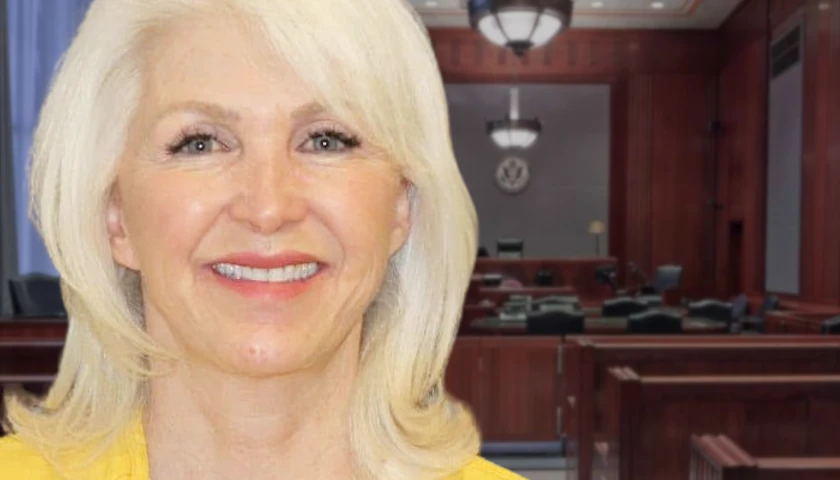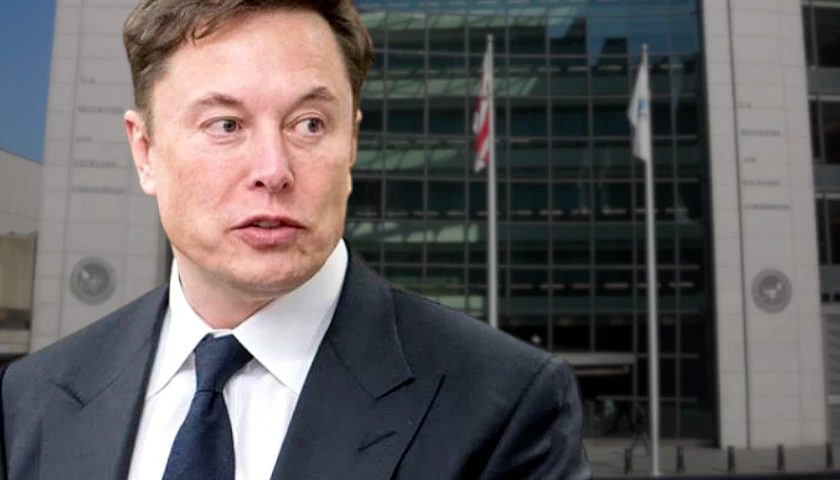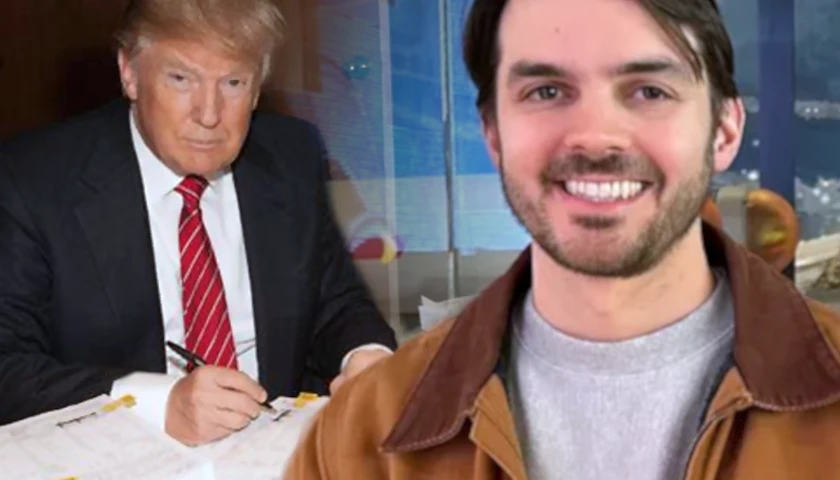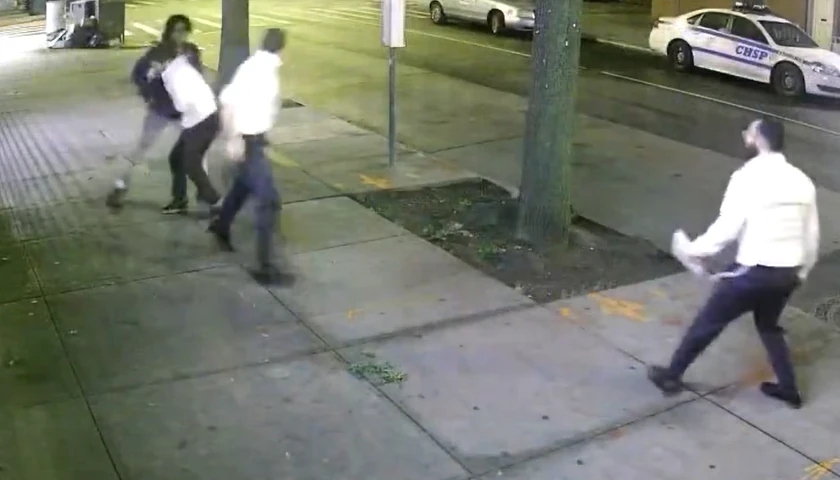The trial of former Mesa County Clerk and Recorder Tina Peters ended on Monday, with the jury unanimously finding her guilty of seven of the 10 counts she was charged with. Peters was prosecuted in relation to backing up an election server since she said she believed that a scheduled upgrade of the election software would override election files that were required to be saved for 22-25 months by federal and state law, and she was concerned there was election fraud in the 2020 and 2021 elections.
After deliberating for around three hours, the jury found Peters guilty on three counts of attempting to influence a public servant, official misconduct, violation of a duty, failure to comply with requirements from the Colorado Secretary of State (COSOS), and conspiracy to commit criminal impersonation. She was found not guilty on another count of conspiracy to commit criminal impersonation, criminal impersonation, and identity theft.
At the conclusion of a trial, the presiding judge – often with input from the attorneys – will issue instructions to the jury. These instructions can limit or demand the jurors interoperate evidence and law in specific ways.
In the landmark case against Donald Trump, Reason argued Judge Merchan’s instructions all but required former president be found guilty:
To convert a single hush payment into 34 state felonies in the New York case against former President Donald Trump, prosecutors are relying on several interacting statutes, which makes their legal theory convoluted and confusing. Juan Merchan, the judge presiding over Trump’s trial, added to the confusion on Wednesday when he instructed the jurors on the conclusions they must reach to find Trump guilty.
Fox News settled a defamation lawsuit from Dominion Voting Systems for $787.5 million because the jury instructions would have been unfavorable if the case went to trial. Dominion asserted that several people, including Rudy Giuliani, Sidney Powell, and the late Lou Dobbs, made defamatory statements on air about the company and election fraud.
In Judge Eric M. Davis’ ruling on the parties’ motions for summary judgment, he indicated that he was going to instruct the jury that they must consider those statements to be false. “The evidence developed in this civil proceeding,” he said, “demonstrates that it “is CRYSTAL clear that none of the statements relating to Dominion about the 2020 election are true.”
District Court Judge Michael Barrett, who was appointed by Democratic Colorado Governor Jared Polis, proposed jury instructions to the attorneys on last week, which resulted in arguing back and forth with Peters’ attorneys. At some point during the discussion, the camera feed stopped, so the negotiations could no longer be viewed by the public.
Barrett included numerous rules from the COSOS in addition to statutes in his instructions to the jury. Without adding further context to provide the full picture, the rules on their face could be construed to prohibit Peters from taking some of her actions, such as using someone else’s badge to enter the election server room.
Barrett kept much of Peters’ defense out of the trial by stating that it was “not relevant.” At one point, he said that because Peters had already committed multiple crimes, the evidence and testimony her defense wanted to bring up weren’t relevant.
A decision by Barrett was overturned in an unrelated case earlier this year by the Colorado Court of Appeals because Barrett declared that the defendant was guilty. In a case involving a fertility doctor who impregnated his patients without their knowledge, a panel of the Colorado Court of Appeals panel ruled that Barrett was wrong to decide before trial that the doctor violated his professional duty at the time of the inseminations. The justices said the decision belonged to the jury, and Barrett should not have relied on his own perception of “common sense” when ruling. They ordered a new trial, reversing a multimillion-dollar jury award, and also concluded Barrett improperly allowed the plaintiffs to request additional damages mid-trial.
Much of the reason for prosecuting Peters came down to her allowing an IT professional, Conan Hayes, to use the badge of another IT professional, Conan Wood, to access the election server room in order to view the software upgrade, known as a “Trusted Build.” Peters said she did this because Hayes, who was secretly working as a government informant, had asked her to conceal his identity.
Wood testified that he did not recall being in a Signal chat group with Peters and some of her staffers where this was discussed. However, the Signal chat screenshots were displayed in the courtroom, revealing that he was part of the plan.
In Maricopa County, election integrity investigator Matt Vanbibber spotted a Maricopa County Elections director, Kristi Passarelli, on video using her badge to allow employee Brian Ramirez access to an election server room in 2022. Vanbibber said Ramirez also used the badge of an employee named Charles Cooley. Passarelli was not prosecuted, and there is no indication that she was disciplined. She eventually moved on to another similar job without repercussions, which was city clerk for the neighboring city of Surprise.
During closing arguments, prosecutor Robert Shapiro, who was fired previously as a prosecutor for “insubordination,” said, “It’s not about computers. … It’s about using deceit to trick and manipulate others.” Peters’ primary defense was that she was concerned that voting machines were being manipulated since, in 2021, four progressive candidates for Mesa City Council won their races, which was a surprise, she said, even to the candidates since that area is 65 percent Republican and 35 percent Democrat.
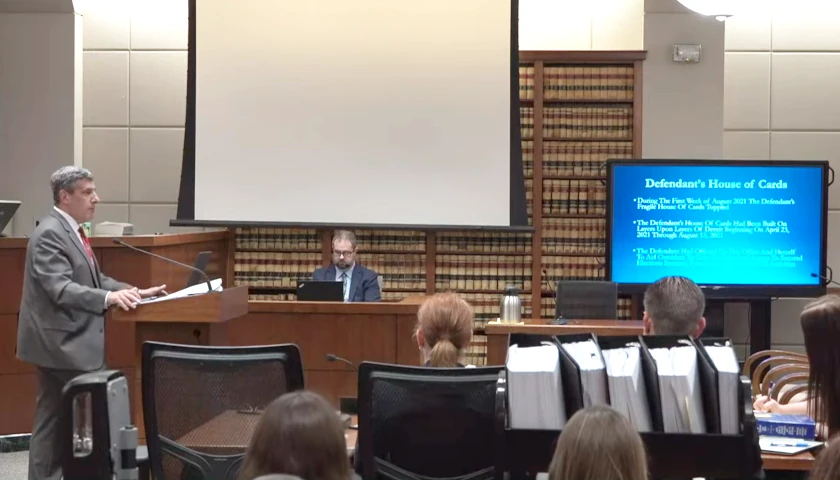
However, when Peters’ attorneys attempted to question witnesses about problems with the voting machine tabulators, the judge disallowed the questions as not relevant. When her team put Dallas Schroeder, the clerk and recorder for Elbert County at the time, on the witness stand, who had also made a backup of his county’s election database out of concerns, he could not answer a single question past confirming his identity.
Shapiro repeatedly objected to Peters’ attorney, John Case, during Case’s closing argument. The judge allowed Case to continue most of the time but told the jury they could not consider what he said since it had not been admitted into evidence. Shapiro objected to Case referencing the federal statute requiring retaining election data for 22 months. Violation of that law is a crime. The judge sustained the objection, stating that the statute had not been allowed into evidence.
Case said the prosecution charged Peters with 10 crimes for one action taken by her. He brought out information that had previously not been revealed during the trial, such as pointing out that two of Peters’ staffers who claimed on the witness stand that they didn’t know Hayes was going to use Wood’s badge were in the Signal chat where it was discussed. He noted that the prosecution never subpoenaed Hayes for the trial, even though Hayes was at the center of the controversy.
An aspect of the prosecution’s case that Peters’ attorneys refuted during the trial was that the video of the Trusted Build leaked to the internet and allegedly included bios passwords of election computers that did not contain those passwords. Testimony came out during the trial that the passwords had been obscured. During his closing argument, Case pointed out that the prosecution never showed the leaked video to the jurors for that reason.
Prosecutor Janet Drake, who was allegedly demoted previously at the Colorado Attorney General’s Office due to being a poor manager, a source told The Arizona Sun Times, said during the prosecution’s rebuttal to Case’s closing argument that Wood was not part of the alleged conspiracy involving the badge. Rule 8.4 of the Rules of Professional Responsibility, which most state bars have adopted, including Colorado, states that attorneys shall not “engage in conduct involving dishonesty, fraud, deceit or misrepresentation.”
Drake also told the jury that Peters gave Hayes “unfettered access.” Peters allowed him into the election server room to observe the Trusted Build and to make a backup of the election server; there was no indication of any other activity.
“We’re here because the defendant deceived a bunch of public servants and caused them to alter their behavior so that she could sneak an unauthorized person into the office with unfettered access,” Drake said.
A sentencing date was set for October 3 at 9:30 a.m. MST. WesternSlopeNow is live-streaming the trial, and more information can be found on Peters’ website.
– – –
Rachel Alexander is a reporter at The Arizona Sun Times and The Star News Network. Follow Rachel on Twitter / X. Email tips to [email protected].

